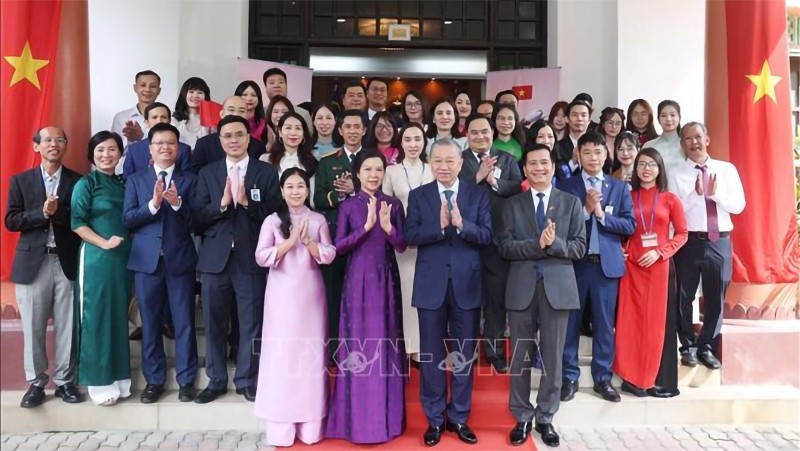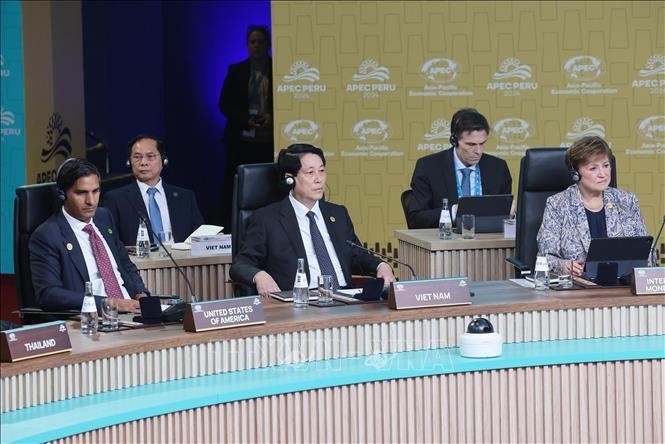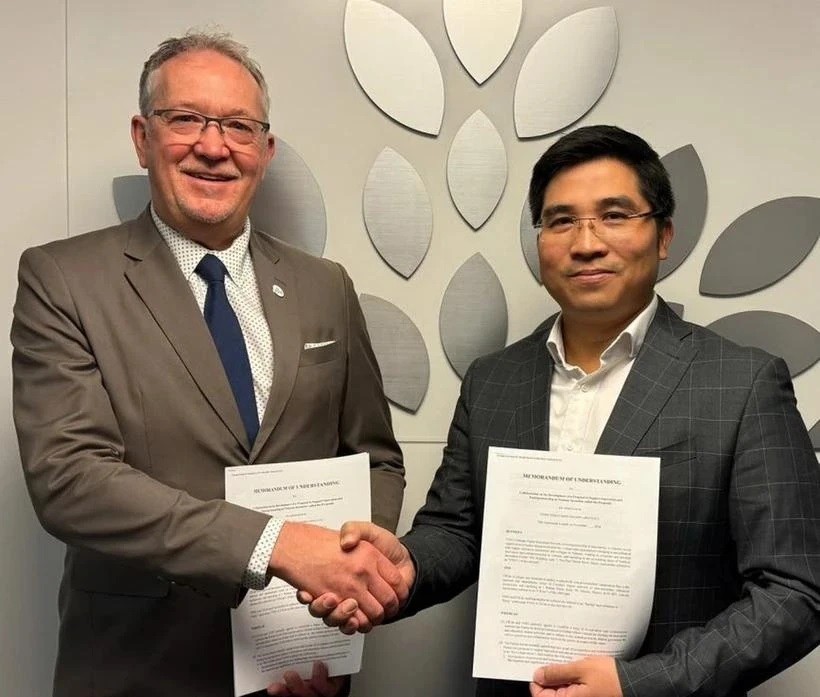Vietnam joins int’l efforts to give children homes
Expanding alternative care is part of the national target program launched by the Vietnamese Government to ensure disadvantaged children in the country are able to grow up in a family environment.
 |
Children in SOS Village in Hanoi. (Photo: VNA)
The revised Child Law2016, enacted on June 1, 2017, introduced legislative support for foster care, said Vu Thi Kim Hoa, Deputy Director of the Department of Child Affairs under the Ministry of Labour, Invalids, and Social Affairs (MoLISA).
“The revision aims to ensure the enforcement of children’s rights in accordance with the spirit of the UN Convention on the Rights of Children (CRC), and the country’s response to international efforts to reduce institutional childcare worldwide,” Hoa said.
As part of its effort to implement the law, in July 2017, the Ministry signed a three-year cooperation agreement with Care for Children (CFC), a UK non-governmental organisation (NGO), to push the implementation of foster care in Vietnam.
The foster care project, jointly implemented by the Ministry and CFC from November 2017, shows Vietnam’s determination to ensure the enactment of children rights, particularly the right to foster care, Hoa said.
The four-phase project is being piloted in Hanoi and the northern province of Thai Nguyen up to 2020.
It focuses on training and providing consultation for governmental staff and social workers in the two localities,while conducting publicity campaigns to raise community awareness on the positive social outcomes of family-based care.
GLOBAL ISSUE OF INSTITUTIONALISED CHILDREN
At least 2.7 million children are living in institutions worldwide.
The figure was described as the tip of the iceberg by UNICEF in its press release on June 1, 2017.
Wide gaps in data collection and accurate records are found in a majority of countries, the press release stated.
Elsewhere, the Save the Children Fund, an international NGO to promote children rights, (aka Save the Children), estimates a staggering number of up to 8 million children living in institutions worldwide, with more than 90 per cent having at least one living parent.
Meanwhile, Step Ahead, an international NGO based in Thailand’s capital city, reports over 145 million children worldwide have lost one or both parents due to a variety of causes.
Both the short-term and long-term wellbeing of a child depends greatly on where they live and the care they receive in those settings, said John Quinley Jr., Step Ahead CEO.
He quoted researches as saying that the long term care of young children in orphanages is associated with attachment disorders and developmental delays in social, behavioural, and cognitive functions.
Step Ahead serves the CRC Coalition’s Alternative Care sub-committee, the International Child Protection Network Advisory Panel, to ensure the best interests of children.
According to UNICEF’s new estimate, based on data from 140 countries, Central and Eastern Europe and Central Asia was found to have the highest rate worldwide, with 666 children per 100,000 living in residential care, over 5 times the global average of 120 children per 100,000.
Industrialized countries and East Asia and the Pacific region have the second and third largest rate with 192 and 153 children per 100,000 respectively.
Research shows some of the key risk factors that result in children being placed in residential care include family breakdowns, health issues, poor or unequal provision of social services, disability, and poverty.
“The priority is to keep children out of institutional care and with their families, especially in the early years,” said Cornelius Williams, Associate Director of Child Protection at UNICEF.
In more developed countries, the practice of placing children in institutions is fading out.
However, efforts to expand community-based care for homeless and orphaned children continue to face numerous challenges in developing nations.
REGIONAL EFFORTS
Step Ahead is in active partnership with the CRC Coalition Thailand, delivering policies, procedural training, and ensuring the implementation of alternative care for orphans and vulnerable children.
In 2009, Step Ahead launched its Keeping Families Together (KFT) programme, aiming to boost alternative care for Thai vulnerable children and orphans.
“Alternative care means children separated from their biological parents living in other care arrangements, such as kinship care, foster care, and residential care,” said John.
“Seventy percent of children in orphanages in Thailand actually have family, but sadly, poverty forces these families to place their children in the institutions,” John told the Vietnam News Agency (VNA).
“KFT’s vision is that no Thai child will grow up in institutional care, rather that all will enjoy life in a safe and nurturing family,” he added.
Likewise, Kinnected Myanmar, an NGO established in 2014, also forms part of regional NGO efforts to reintegrate local institutionalised children into family-based care.
“Orphanages are not the best places for children and can cause long-term mental and emotional harm”, said Joney Thawng Hup, Director of Kinnected Myanmar.
Many of them harbour and develop strong feelings of abandonment. Those sent away from their homes also face other serious risks, such as human trafficking, he said.
According to Joney, many desperate parents in Myanmar choose to put their children into orphanages with the hope that they will receive better food, clothing, and education.
Over 74 per cent of institutionalised children in the country have living parents, said Joney Thawng Hup.
In a similar effort, Children in Families (CIF), a Cambodian NGO, works on providing direct services to Cambodian orphans and vulnerable children by placing them in kinship care and foster care, as well as extra services for children with special needs.
General Manager of CIF Lynny Sor has told VNA that CIF was established and registered in 2009. As of now, CIF has helped 671 children by providing financial support, training to families, as well as follow-up visits by case workers on a monthly basis to ensure that children are provided with proper care in loving families.
Based on CIF care experience, family-based care is much more cost-effective than institutional care, being likely to cost at least five times less than keeping a child in institutional care.
According to Sor, over 80 per cent of Cambodian institutionalised children are not orphans and have at least one living parent. The Cambodian Government is working actively with NGO partners, aiming to reduce the rate by 30 per cent this year.
In order to reduce this figure, CIF is providing direct support services to children and families, as well as providing technical support on alternative care to NGOs and residential care institutions, engaging them to make efforts to ensure more children (including children in residential care) are being reintegrated back into families and no more children are being referred to residential care institutions./.
VNF/VNA
Most read
Recommended
 National
National
Vietnam News Today (Nov. 27): Vietnam Seeks Danish Assistance in Green Energy Development
 National
National
Vietnam, Malaysia Look Forward to New Era of Development
 National
National
Vietnam News Today (Nov. 26): Party Leader Receives Bulgarian President
 National
National
Vietnam News Today (Nov. 25): Cambodia Attaches Importance to Defense Cooperation With Vietnam
Popular article
 National
National
General Secretary To Lam Meets Vietnamese Community During Embassy Visit in Malaysia
 National
National
Vietnam News Today (Nov. 24): India, Vietnam Strengthen Coordination Capability in UN Peacekeeping Operations
 National
National
President of Vietnam Luong Cuong Proposes Direction for Promoting APEC's Role
 National
National








